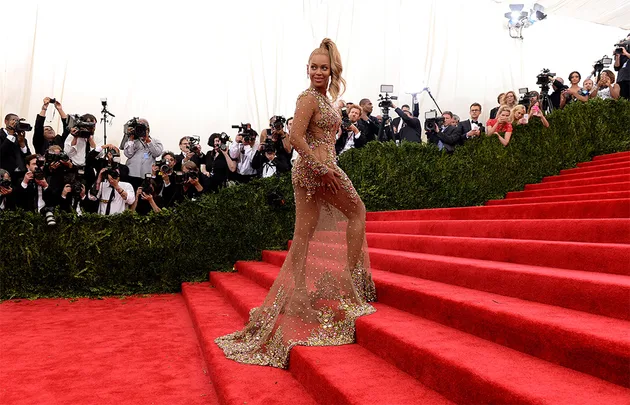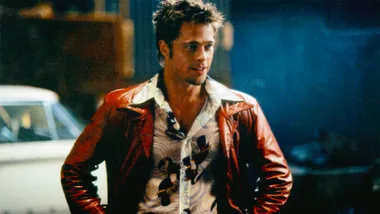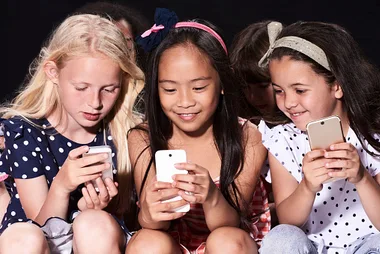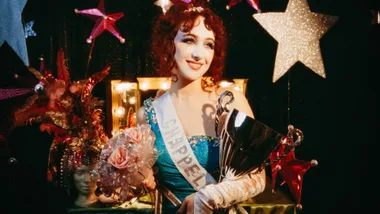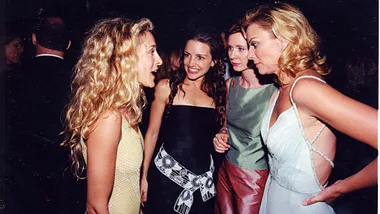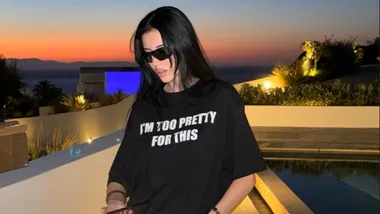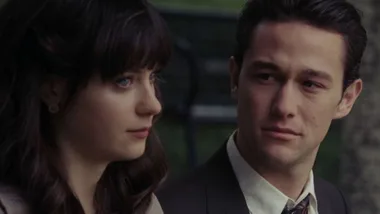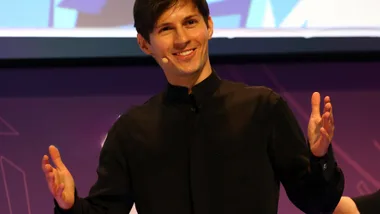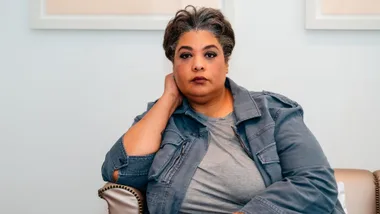In January 2013, Beyoncé appeared on the cover of a US men’s magazine, her arms raised above her head in a gesture of saucy abandon, her famous booty arched seductively skywards, wearing little more than a red G-string and a knowing pout. Inside, she appeared in seven additional photos. In each image, she was equally as beautiful. In each one, she was similarly naked.
Three months later, Queen Bey embarked on “The Mrs Carter Show World Tour” (named in honour of her husband), and began shimmying her way around the world’s stages in a blur of chart-topping anthems, tousled hair extensions, toned limbs, and microsized spray-on leather ensembles.
Fast forward one year and the singer, who had previously and controversially described herself as a modern-day feminist, helped contribute to The Shriver Report, the Maria Shriver-led “investigation into the status of women in America”. “Women,” opined Beyoncé, “need to stop buying into the myth of gender equality. It isn’t a reality yet.”
“Women need to stop buying into the myth of gender equality.”
Beyonce
The essay went live – and the internet went into meltdown. There were long, earnest opinion pieces arguing that Beyoncé represented a new breed of feminist. There were equally long essays arguing the opposite. Academics weighed in. A respected US university announced the launch of a feminism course called “Politicizing Beyoncé”.
There was one thing no-one could argue with. After falling out of fashion, the F-word – Feminism – or girl power, or female empowerment or whatever you want to call it, is once again in the spotlight, fuelled by a turbo-powered wave of social media connections, internet activism, the boldness that comes from having a modicum of power, and a string of A-list advocates.
Late last year, Mission Australia’s annual youth survey found that, for the first time, “equity and discrimination” was number one on the list of “most important issues in Australia today” for teenage girls. For the first time ever, paid parental leave is a hot political issue, and big companies are being forced to report on salaries of male and female employees.** And Prime Minister Tony Abbott’s “one-woman cabinet” decision was met with widespread derision.
In the US, President Barack Obama, in his State of the Union address in January, said the gender pay gap was “wrong” and “an embarrassment”, and told his fellow patriots that “when women succeed, America succeeds”. Meanwhile, a proliferation of feministleaning websites has sprung up across the internet, from Jezebel to Australia’s Daily Life, and last year it was announced that the original counterculture feminist magazine of the 1970s, Spare Rib, would be relaunched as a website and a bimonthly. It eventually appeared as the site Feminist Times.
Add to this the groundswell of support for a Hillary Clinton presidency, the massive popularity of Facebook COO Sheryl Sandberg’s Lean In movement, and the success of websites such as The Everyday Sexism Project, which asks women to contribute stories of blokey boorishness in a safe online space.
Feminism has even pierced the notoriously sexist world of advertising. A recent commercial for a shampoo brand, playing on double standards about working women, went viral, attracting 40 million hits on YouTube.
Then there are the celebrities. For every Katy Perry or Taylor Swift who prefers not to be called the F-word, there is a Lorde or a Tavi Gevinson who wears the badge with not just pride, but in-your- face joyfulness. When comedians (and out-and-proud feminists) Tina Fey and Amy Poehler took the stage to host this year’s Golden Globes, they turned the tables on Hollywood’s notorious gender double standards by mocking George Clooney for dating young women. The crowd couldn’t have loved it more.
What, or who, has sparked this renaissance? Is it down to social media and the power of the internet? Is it because a generation of young women raised in the post-feminist era are still bumping their well-groomed heads against a glass ceiling? Or, is it down to dismay that, after all this time, female leaders such as Hillary Clinton and Julia Gillard continue to face sexism? After all, if the most powerful women in the world have trouble with misogyny, what hope do the rest of us have?
Some commentators believe feminism’s latest incarnation can be traced to British journalist Caitlin Moran, who published a call to arms in her 2012 memoir, How To Be A Woman. In it, she identified the importance of giant underpants to the feminist cause – arguing that comfort should take precedence over the modern mania for sexy briefs, which women wear in the “demented belief” that they might face, at any moment, a snap inspection of their “total hotness”. She asked why on earth women wear stilettos. And she talked about vaginas, a lot.
Her approach was a little different to her feminist foremothers. When Virginia Woolf published her seminal essay, A Room Of One’s Own, in 1929, she railed against the lack of educational opportunities afforded to girls by a society that believed “the best woman was intellectually the inferior of the worst man”. In the 1940s, Simone de Beauvoir declared in The Second Sex that women were not born, but placed in the role by society. And in the ’70s, Germaine Greer argued the suburban nuclear family repressed women sexually.
These women have different preoccupations, but their argument has been the same across the decades: why we should care about gender equality. It’s the method of delivery that’s changed.
Dr Rebecca Huntley, executive director of social research company Ipsos, believes the internet is behind the latest push for gender equality, having finally offered women access to a means of mass communication. “Women have more of a voice online than they ever did in traditional media,” says Dr Huntley. “It might seem like feminism is suddenly trendy. Maybe it is more that we are suddenly hearing, via the internet, the conversations that women were previously having among themselves.”
Laura Bates, the UK feminist founder of The Everyday Sexism Project website, which she has turned into a soon-to-be-published book, says feminism has “absolutely” enjoyed a resurgence in popular culture. “I think we’re reaching a tipping point where people are finally feeling able to stand up to high-profile misogyny and sexism,” states Bates. “Because the more people who speak out about it, the harder it is to silence it.”
In Australia, we experienced our own tipping point in the form of Julia Gillard’s prime ministership, which many believed revealed the underbelly of sexism in society. While a lot of this nastinesswas passed around the darker corners of the internet, so, too, was Gillard’s famous misogyny speech.
While traditional media outlets downplayed the impact of the fiery speech, it set the internet and social media alight. Within 24 hours, the video of her speech received more than 300,000 views, and “Gillard” became one of the top trending words on Twitter, her heartfelt outpouring making headlines across the world, from India to the US.
The founder of US website Jezebel, Anna Holmes, believes blogs have helped make feminism accessible. The former magazine writer, who was asked to launch a “girlie” version of the news-based Gawker.com in 2007, decided early on that the website would be underpinned by feminist values – a decision that, back then, was ahead of its time. “I used the word ‘feminist’ once to the higher-ups and they blanched,” she told The Guardian. “So I knew I had to be a bit subversive about it.”
“People are finally feeling able to stand up to high-profile misogyny and sexism”
Laura Bates, The Everyday Sexism Project
It was soon obvious Holmes’s instinct was right: within two months Jezebel’s staunchest fans were referring to themselves as “Jezzies”; within two years the site had overtaken big brother Gawker, with more 50 million hits a month. Holmes has attributed Jezebel’s success partly to timing: “a reaction to things like attacks on abortion access, the way female politicians [such as Hillary Clinton] have been treated”.
But she has also cited the site’s tone, which is both versatile – traversing the cheap and the deep, from gossip to feminism, shoes to sexism – and irreverent. Neither, it’s fair to say, are qualities traditionally associated with feminism. Case in point: when reporting on the misogyny speech, Jezebel called the prime minister “badass” – a high compliment which reflects the humour that has crept into latter-day feminism. Gone are the po-faced sisters of the 1970s, who wore dungarees and saw a threat in every joke. These days women like Fey and Poehler, and fellow comedians like Sarah Silverman and Mindy Kaling, source much of their humour from the vagaries of sexism and use mockery to take out dinosaurs like the late Christopher Hitchens, who famously wrote a Vanity Fair article entitled “Why Women Aren’t Funny”.
The result is a shift that if not seismic, is certainly marked. A piece by feminist writer Jessica Valenti in the Washington Post argued that if Hillary Clinton runs for president in 2016, sexist jibes could well help her – by galvanising the female (and sympathetic male) vote in her favour. “The world of gender politics has changed in the past six years,” writes Valenti. “The sexist jibes that were normal then won’t fly in a post-‘war on women’ culture.”
And yet, many women still have an uneasy relationship with the actual F-word. Even while women are sharing female stories on the web, listening to Beyoncé albums and have come to expect equality in the workplace, they are reluctant to view themselves as feminists. A recent marie claire survey** showed that while four in five women do not believe men and women are treated equally in Australia, only one in five refers to herself as a feminist. Threequarters of those surveyed said they believe in equality but the word “feminist” is too strong for them.
Dr Huntley says the young women in her research groups discuss gender inequality a lot, without needing to say whether they are feminists. “The public perception and view of feminism in the ’70s was so radical,” says Dr Huntley. “Now it’s less about that. These issues are discussed without having to advertise a personal signifier like ‘I am a feminist’.”
Others see feminism as being synonymous with man-hating, and many object to the vilification of men in its name. Recently, Sunrise television presenter David Koch was accused of “humiliating” co-host Samantha Armytage with a prerecorded joke about pole-dancing. In a live televised defence of Koch, Armytage articulated the feeling of many women when she said:
“I do not like this part of the sisterhood that insists on running down men to be a feminist or part of the sisterhood.”
Even within the feminist community disagreement continues to rage as to who is a feminist. In the highly flammable twittersphere, Beyoncé’s credentials get questioned but so, too, do Facebook COO Sheryl Sandberg’s and Michelle Obama’s, not to mention many men who identify as feminists themselves. It’s safe to say that this kind of in-fighting does little to advance the cause.
No matter what women call themselves, the discrimination they encounter is real, and it is ongoing. Women still earn, on average, $266 a week less than men. In other words, the average Australian woman earns 82.5c for every dollar a bloke earns. Other feminist issues – domestic violence, the sexualisation of women, the number of women in top jobs – remain similarly unresolved.
As long as there is this sort of discrimination to conquer, it probably doesn’t matter what we call ourselves, or, for that matter, whether or not we approve of giant undies. All that matters is that we keep the conversation going. That we keep talking until – to paraphrase Beyoncé – girls do indeed run the world. Or, at least until young girls no longer have to worry about equality and discrimination.
Facts:
Over a lifetime, men earn $1 million more than women
80% of Australian Women believe men and Women are not treated equally in this country
The pay gap between full-time working men and women is 17.5% this rises to 28.3% once you’re in senior management
When asked about the pay gap between men and women, nearly half of women underestimate it (or don’t realise it exists)
60% of university students are women, just 17.6% of directors on asx200 boards are female.
